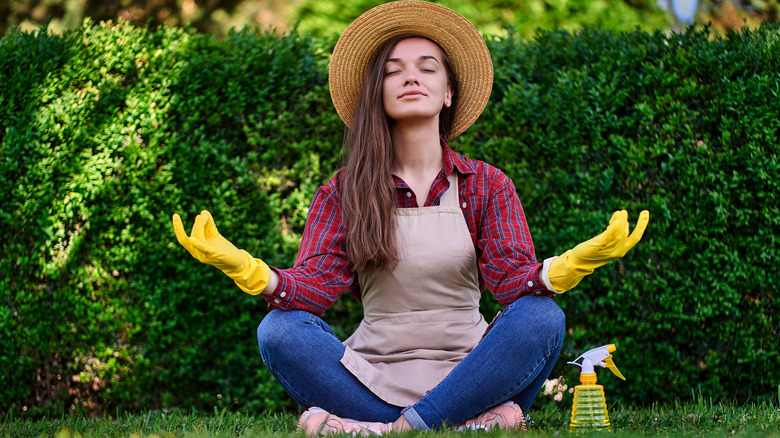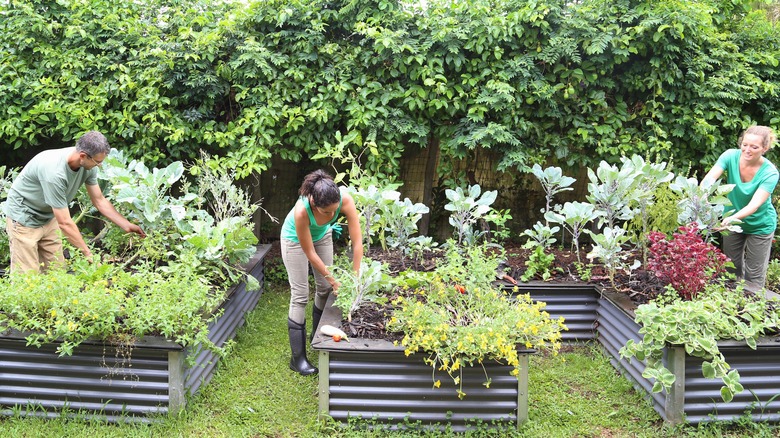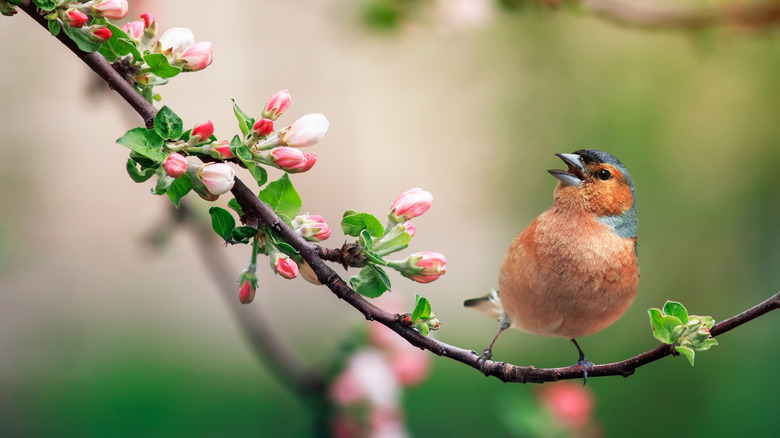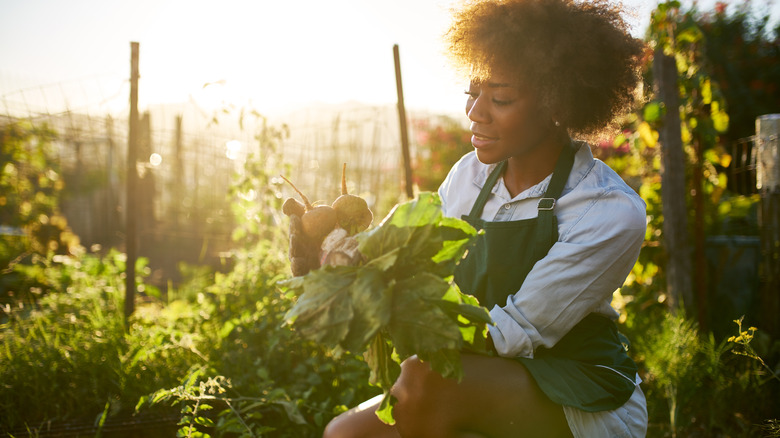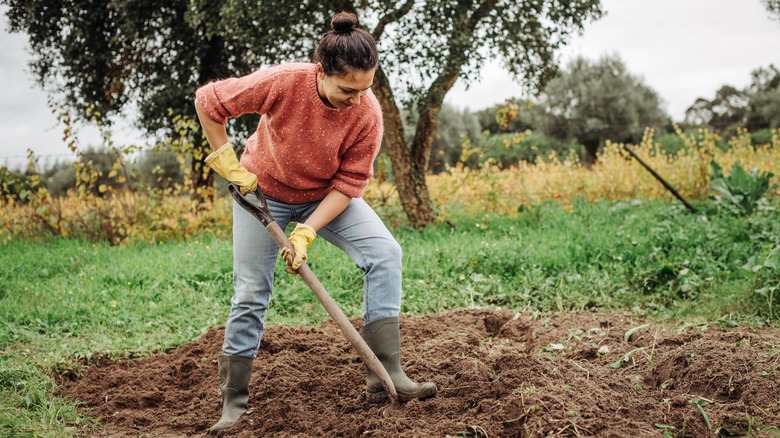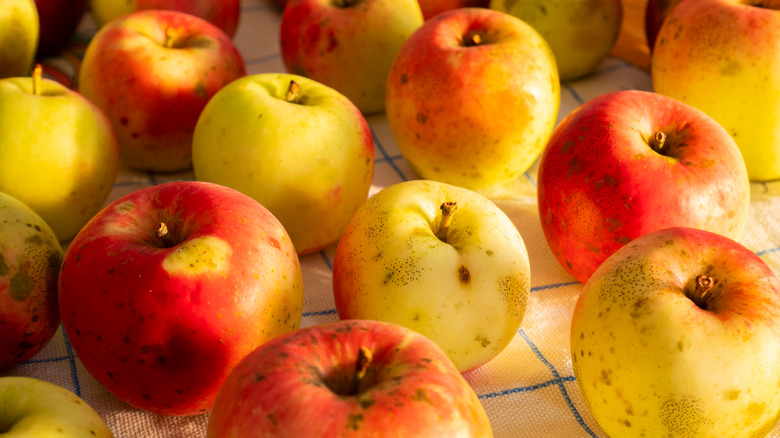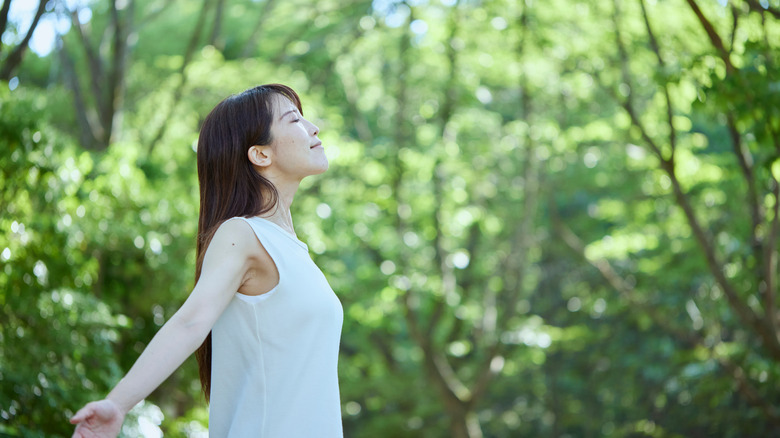10 Reasons Why Gardening Is Good For Your Mental Health
There's no denying that time spent outdoors in a natural setting is good for the body and mind. Similarly, regular engagement in a hobby has been shown to relieve anxiety and tension. Whether it's done to increase productivity and purpose or simply for enjoyment and pleasure, the Mental Health Education Extension at Utah State University explains that finding time to dedicate to a hobby can result in many positive long-term side effects directly related to our mental health.
Here at House Digest, we love to spend as many hours as we can afford tending to our gardens, and we gather you do as well. If you struggle to find the time, remind yourself that even having your hands in the dirt for just a few minutes can go a long way to counteract the burnout associated with stressful occupations or life situations. Micro breaks from the computer rest our eyes and calm our nerves, and a quick jaunt out to check the status of our emerging carrot crops could make those break times more beneficial than ever.
1. Growth mindset
No matter how big or small you want your backyard vegetable patch to be, as a beginner gardener, you quickly realize just how much there is to learn. If you let it, the inevitable trial and error that follows can be the key to unlocking the door to a growth mindset. What feels frustrating initially will eventually be followed by abundant, delicious, often beautiful success. Cut flowers in your entryway or the delectable dish on your dining room table featuring your homegrown cucumbers will prove that the learning curve was well worth the effort.
2. Stress reduction
Fresh air, sunshine, and loamy earth between your fingers — the same things that make plants grow also bring much-needed peace and relaxation. Even if you don't have enough time to sink into a full meditation, just tending the garden is likely to lower your stress a notch or two. If you ask us, yoga and gardening seem like a natural combo. Take a minute to sit quietly amongst your growing plants, and if you've got enough room, why not strike a pose between your rows of squash and pumpkins?
3. Surrender control
Try as they might, even the most knowledgeable gardeners cannot control the weather. Anyone growing plants outdoors will be faced with the sheer force of Mother Nature at some point, maybe more often than they'd like. Do we give up when a freak snowstorm hits just after we've planted our seedlings, or do we put on our rain boots and splash around in the puddle as the snow melts? Verywell Mind asserts that learning how to surrender the need to control sets us up to handle better whatever obstacles life throws at us.
4. Sense of community
A love of gardening is a great uniter. Think of all the people you'll interact with throughout a given season: nursery workers, plant disease experts at the local university extension service, and your neighbors as they eye your gorgeous tomatoes ripening on the vine. Under the right circumstances, shared enthusiasm for growing your own food could lead to starting a community garden, a new set of friends, and social activities that joyfully fill your weekends.
5. Improve cognition
It's common knowledge that time in nature helps reduce anxiety and stress, but did you know it also offers cognitive benefits? According to the American Psychological Association, research now shows that exposure to the natural world increases cognitive development and our ability to pay attention. It's not only the sights and smells that recharge our brains; listening to the sounds of nature has been linked to better performance on cognitive tests. It seems like it's time to take that break from the computer and listen to some garden-inspired birdsong.
6. Practice being present
Plants require attention. It's a simple fact of the garden that we have to tend to the needs of our crops if we want them to be healthy, which means pausing the doom scrolling to be present in the garden. For the vegetable growers, this refreshing feeling of presence may carry into the kitchen. As you cook and eat food you've grown, you can recognize and appreciate the bounty from your garden and all the hard work you put into it.
7. Get your body moving
Out in the garden, you'll be standing, squatting, twisting, pulling, and much more. Between bending to plant seedlings and hauling large bags of soil conditioners and fertilizer, gardening is an active and physical pursuit. Note that accommodations such as raised garden beds and wide rows for easier maneuvering are available to anyone who needs assistance. Just don't fool yourself into believing that an hour spent weeding won't be felt somewhere in the body the following day.
8. Encourage healthy eating habits
A healthy diet plays an important role in our overall mental health. If you've got 20 pounds of summer squash piled on the table from the most abundantly fruiting zucchini plants you ever did see, chances are good you'll be breaking out the cookbooks for recipe inspiration. Of course, you'll find a home for some of them in tasty muffins or a zucchini cake with cream cheese frosting (and we wouldn't blame you), but when combined with your freshly picked baby spinach, there's sure to be plenty of salads made too.
9. Relinquish perfectionism
We toil for months only to find the fruits of our labor are misshapen, bruised, or simply not as shiny as those we'd find at the grocery store. As we get better at surrendering to the elements we can't control, gardening also teaches us to relinquish an attachment to perfectionism. Oregon Counseling explains that unattainable standards and a fear of failure reduce our overall sense of well-being. Yet, when we pick that first perfectly imperfect apple that took two years to grow, we'll still enjoy its delicious taste.
10. Forest bathing
Noted by National Geographic as the cure to technological burnout and too much screen time, Shinrin-yoku, the Japanese art of forest bathing, expands on the practice of spending time in nature. Furthermore, Psychology Today links the simple act of looking at the color green to enhanced creativity, desire to socialize, and ability to complete mental tasks. What better way to surround yourself with green than by taking a figurative bath in the color as it bursts forth from the grasses, lettuces, foliage, and young fruits bursting from your backyard garden?


